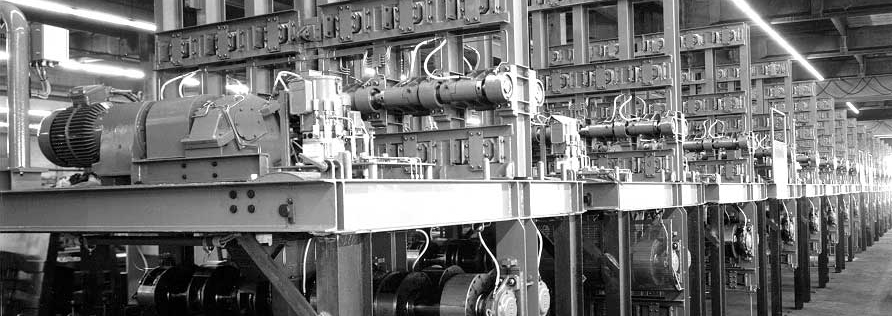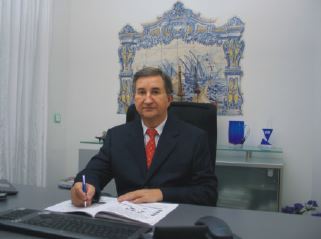
Background of VeCon Stamping Technology – Historical Overview

Introduction
VeCon GmbH was founded by Mr. Gerd J. Veit in the year 2002 in Heusweiler / Germany. Prior to founding his own company VeCon GmbH, which supplies engineering, consulting, technical support and hardware mainly for stamp charged coke oven plants, Mr. Veit was associated almost all his job life in businesses related to coke making. This short summary should give an overview and a background, where Stamping Technology and in parallel, where VeCon GmbH are coming from.
Stamp Charging – A technology developed to resolve own weaknesses
A company called Saarbergwerke AG was the owner of plenty of small coke plants in the Saar region. In the middle of the 1950’s all small coke plants were closed down and a new, more efficient, top charging coke plant in Fürstenhausen was built for a production capacity of about 1 MTPA. The general advantages of stamp compared to top charging were in principle known in this time. However, stamp charging could neither compete with the in production output nor with the environmental standards with “top charged coke plants”. The major reasons were the poor coking properties of the regional “Saar” coal, the low efficiency of the compacting process and the lack of necessary technology. Knowing these weaknesses, the management of the plant in Fürstenhausen went on to develop “Stamp Charging” to a state of the art technology, which can compete in all respect (productivity, environmental standards) with any other coke making processes. From the time the plant was established, the development of stamp charging process took about two decades until this technology could reach the desired level of confidence in Fürstenhausen coke plant. In view of this success, Saarbergwerke AG founded its subsidiary called “Saarberg Interplan” to bring the newly developed coke making technology to international market. In the 1980’s, nearby in the Saar region, the steel plants were re- organized and centralized. So a new central coke plant called ZKS (Zentralkokerei Saar) was set up with the newly developed stamp charging technology. The coke plant was owned to 49 % by the Saarbergwerke AG and had an initial coke capacity of about 1,3 MTPA.
Mr. Veit, being a process engineer from technical university (RWTH) of Aachen, worked after a short time he spent in the field of oven building in jobs related to coke making with the stamp charging process worldwide. From 1979 to 1981, he worked for the company Saarberg Interplan, a subsidiary of former Saarbergwerke AG. He left Saarberg Interplan by end of 1981 and became deputy of the former Director of the coke plant association Saar. In this function, he was largely responsible for the Basic Engineering of the new coke plant ZKS. After this assignment was over, he went to the coke plant of Fürstenhausen, whose managing director he became after some time. Under Mr. Veit’s guidance, a lot of developments took place regarding detail improvements at mechanic parts of the stamping machines, which clearly increased the efficiency of the compacting process and the lifetime of the friction liners at the drop hammers. Besides setting up a new wastewater treatment plant, special attention was given by Mr. Veit to the improvement of the environmental conditions of the plant during charging. Finally, a “Charging Gas Transfer (CGT) System” was firstly applied in a stamp charged coke plant with highest success. Using this technology, almost “smoke free charging” could be realized.
These major milestones, achieved by Mr. Veit, resolved last deficiencies, stamp charged plants had versus other coke oven processes.
VeCon Stamping Technology – From Germany to the world
Under the guidance of Mr. Veit, Saarberg Interplan applied the stamping technology on the international market firstly at Tata Steel (Batteries 7, 6, 5 and 8 & 9 in Jamshedpur) in India. Prior to the first successful implementation in India, the study report conducted by Saarberg and Saarberg Interplan had already proven the success in advance. Technically responsible person at Saarberg Interplan was Georg Bauer. He started his assignment as deputy of the designer in charge. Mr. Bauer provided design and engineering for stamping machines, but also for SCP-Machines. The first job Mr. Bauer was largely involved, were the SCP-Machines for the coke plant ZKS. His responsibility went up during the following years when he went up to be the chief designer of Saarberg Interplan for the SCP-Machines developed for Tata Steel in India and Alchevsk in Ukraine. Mr. Bauer was also deputed to Tata Steel for the project realization of all machines built from 1986 till 2000. These jobs included supervision of manufacturing, erection and commissioning.
Mr. Bauer joined VeCon GmbH, found by his former colleague Mr. Veit, in January 2004 as Chief Engineer. This leads to the fact, that VeCon has got unique own in house experience on Stamp Charging of more than 30 years, although the company was founded in 2002 only. Mr. Veit and Mr. Bauer were using their widely spread experience in stamping technology to achieve more and more improvements on all stamp charging machinery like the Stamping System itself but also for CP- and SCP-Machines and for environmental technology like CGT-Machines and oven pressure control system, which are nowadays in the portfolio of VeCon GmbH. With this success, VeCon GmbH could sell more than 25 Stamping Systems for conventional slot ovens on the international market, especially on the rapidly growing Chinese market. VeCon GmbH could prove their advanced technology level by supplying and successfully commissioning the Stamping System for the world’s highest coal cake of 7.1m in China. Being engineers, but also pioneers, Mr. Bauer and Mr. Veit together with the VeCon team were bringing stamping technology also to heat recovery coke plants in the world, especially to India. All necessary machinery (compacting station, charging and pushing machines, hot coke machines) were developed from the roots according to the experience of VeCon GmbH, successfully commissioned and constantly improved. This technology for heat recovery coke plants forms the basis of the second half of the portfolio of VeCon GmbH. Based on this developments, today almost no new heat recovery plant is operated in any other process.
VeCon stamping technology is developed on the basis of wide spread experience in the field of coke making from former engagements of key persons of VeCon GmbH like Mr. Veit and Mr. Bauer. On this basis, VeCon technology has steadily and clearly improved compared to the technology level of the former Saarberg Interplan. This leads to the fact, that VeCon GmbH offers most sophisticated, reliable, cost-efficient and highest technical level of technology and machinery for stamp charged coke making for conventional by-product and heat recovery coke plant such as Stamping/Compacting Systems, CP- and SCP-Machines, Hot Coke Cars, CGT-Systems, oven pressure control system and complete coke plant automation.
